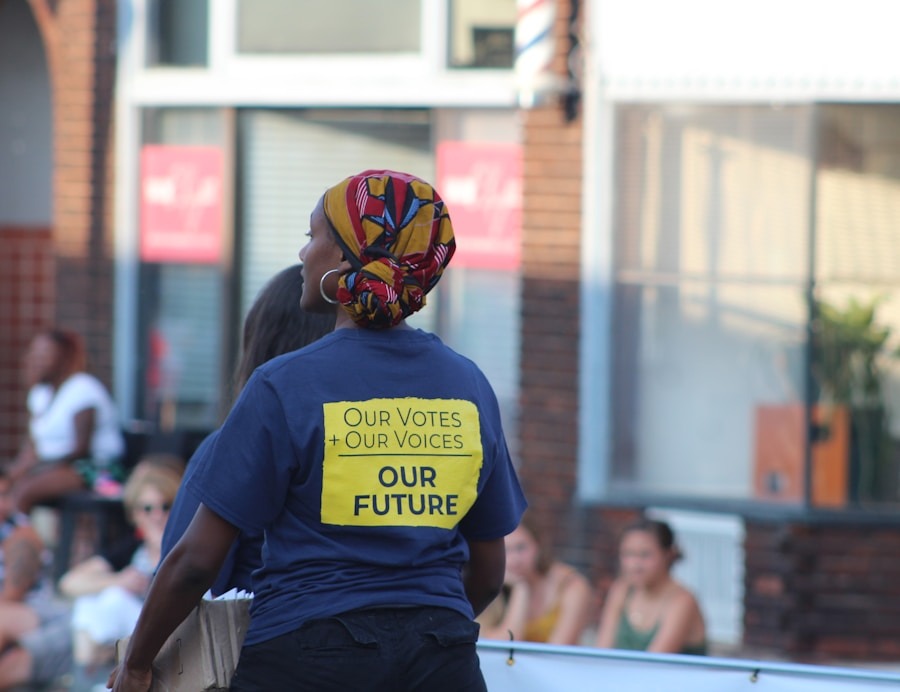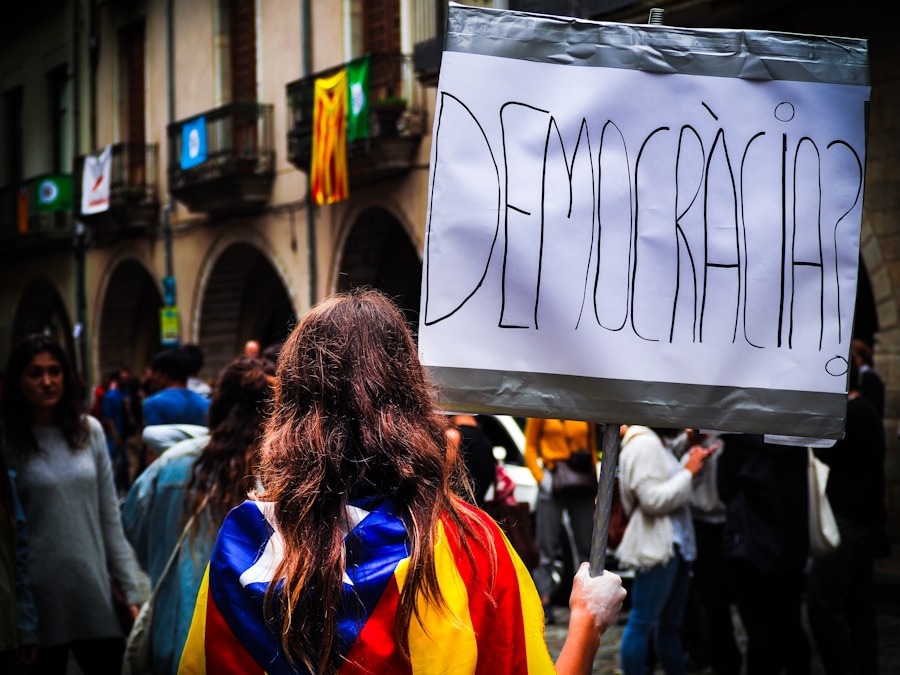Inclusivity is a cornerstone of democratic ideals, serving as a fundamental principle that ensures all voices are heard and represented within the political landscape. In a truly democratic society, the participation of diverse groups is not merely encouraged; it is essential for the legitimacy and effectiveness of governance. When inclusivity is prioritized, it fosters a sense of belonging among citizens, allowing them to engage meaningfully in the political process.
This engagement is crucial for the health of democracy, as it cultivates a populace that is informed, active, and invested in the outcomes of their governance. Moreover, inclusivity in democratic aims extends beyond mere representation; it encompasses the recognition and validation of different perspectives and experiences. This recognition is vital for addressing systemic inequalities that have historically marginalized certain groups.
By ensuring that all segments of society have a seat at the table, democracies can better reflect the complexities of their populations. This not only enhances the quality of decision-making but also builds trust in institutions, as citizens see their concerns and aspirations acknowledged in policy discussions. The interplay between inclusivity and democratic aims thus creates a more resilient and adaptive political environment, capable of responding to the needs of its constituents.
Key Takeaways
- Inclusivity is crucial for achieving democratic aims as it ensures that all voices are heard and represented in decision-making processes.
- Strategies for promoting inclusivity in democratic processes include implementing affirmative action policies, providing equal access to resources, and creating platforms for marginalized groups to participate.
- Addressing barriers to inclusivity in democratic systems requires addressing systemic discrimination, providing education and awareness, and creating policies that promote equal opportunities for all.
- Diversity plays a key role in building an inclusive future by bringing different perspectives, experiences, and ideas to the table, leading to more comprehensive and effective decision-making.
- Overcoming challenges to inclusivity in democratic practices involves actively dismantling discriminatory practices, promoting diversity in leadership positions, and creating inclusive spaces for dialogue and collaboration.
- The benefits of an inclusive future for democratic societies include increased social cohesion, improved decision-making, and a stronger sense of community and belonging for all members.
Strategies for Promoting Inclusivity in Democratic Processes
Electoral Reforms for Inclusive Representation
One effective strategy is the implementation of proportional representation systems, which can help ensure that minority voices are not drowned out by majority rule. By allowing for a more equitable distribution of power among various political factions, proportional representation can lead to a more diverse array of viewpoints being represented in legislative bodies. Countries like Sweden and New Zealand have successfully employed such systems, resulting in parliaments that better reflect the demographic makeup of their populations.
Active Outreach and Engagement Efforts
In addition to electoral reforms, fostering inclusivity requires active outreach and engagement efforts aimed at underrepresented communities. This can involve creating platforms for dialogue where marginalized groups can express their concerns and aspirations directly to policymakers. Community forums, town hall meetings, and participatory budgeting initiatives are examples of how governments can facilitate this engagement.
Empowering Citizens through Education
By actively seeking input from diverse populations, democratic institutions can not only enhance their legitimacy but also develop policies that are more responsive to the needs of all citizens. Furthermore, educational programs aimed at increasing civic literacy can empower individuals from all backgrounds to participate more fully in democratic processes.
Addressing Barriers to Inclusivity in Democratic Systems

Despite the importance of inclusivity, numerous barriers persist that hinder equitable participation in democratic systems. One significant obstacle is socioeconomic inequality, which often correlates with political disenfranchisement. Individuals from lower-income backgrounds may lack access to resources such as education, transportation, or time off work, all of which are critical for participating in democratic processes like voting or attending public meetings.
Addressing these barriers requires targeted interventions, such as providing transportation services to polling places or offering flexible voting hours to accommodate working individuals. Another barrier to inclusivity lies in systemic discrimination based on race, gender, sexual orientation, or disability. These forms of discrimination can manifest in various ways, from voter suppression tactics to social stigmas that discourage participation.
For instance, marginalized communities may face intimidation at the polls or encounter bureaucratic hurdles that disproportionately affect them. To combat these issues, it is essential for governments to implement policies that protect voting rights and promote accessibility. This includes measures such as automatic voter registration, language assistance at polling places, and outreach campaigns specifically designed to educate underrepresented groups about their rights and available resources.
The Role of Diversity in Building an Inclusive Future
Diversity plays a pivotal role in shaping an inclusive future for democratic societies. A diverse population brings a wealth of perspectives, experiences, and ideas that can enrich public discourse and lead to more innovative solutions to societal challenges. When individuals from various backgrounds collaborate in decision-making processes, they are more likely to consider a broader range of issues and potential impacts on different segments of society.
This collaborative approach not only enhances the quality of governance but also fosters social cohesion by promoting understanding and empathy among diverse groups. Furthermore, embracing diversity within democratic institutions can serve as a powerful symbol of commitment to inclusivity. When political leaders and representatives reflect the demographics of their constituents, it sends a message that all voices matter and that governance is truly representative.
For example, countries like Canada have made significant strides in increasing diversity within their political leadership, resulting in policies that address the unique needs of various communities. This representation can inspire future generations to engage with democracy actively, knowing that their identities and experiences are valued within the political sphere.
Overcoming Challenges to Inclusivity in Democratic Practices
While the pursuit of inclusivity in democratic practices is essential, it is not without its challenges. One major hurdle is the resistance from established political entities that may feel threatened by changes aimed at increasing diversity and representation. These entities often possess significant power and influence, making it difficult for new voices to emerge within the political landscape.
To overcome this resistance, advocacy groups and grassroots movements must work tirelessly to raise awareness about the importance of inclusivity and mobilize public support for reform initiatives. Additionally, misinformation and polarization can create an environment where inclusivity is viewed with skepticism or hostility. In an age where social media amplifies divisive narratives, fostering a culture of understanding becomes increasingly challenging.
Educational initiatives that encourage open dialogue about differing viewpoints can help bridge divides and create a more inclusive political climate. By fostering an environment where diverse opinions are respected and valued, democracies can work towards overcoming the challenges that impede inclusivity.
The Benefits of an Inclusive Future for Democratic Societies

The benefits of fostering an inclusive future for democratic societies are manifold and far-reaching. One significant advantage is enhanced social stability; when individuals feel represented and heard within their political systems, they are less likely to resort to unrest or violence as a means of expressing dissatisfaction. Inclusivity fosters trust in institutions and encourages civic engagement, leading to a more harmonious society where individuals work collaboratively towards common goals.
Moreover, inclusive democracies are better equipped to address complex societal challenges such as climate change, economic inequality, and public health crises. Diverse perspectives contribute to more comprehensive policy solutions that take into account the needs and experiences of various communities. For instance, during the COVID-19 pandemic, countries with inclusive decision-making processes were often more successful in implementing effective public health measures that considered the unique challenges faced by marginalized populations.
In conclusion, an inclusive future not only strengthens democratic institutions but also enriches the social fabric of society itself.
In a related article, “Exploring Husserl’s Philosophy: Essence, Intentionality, and Bracketing,” the author delves into the philosophical concepts of Edmund Husserl, a prominent figure in phenomenology. This article discusses Husserl’s ideas on essence, intentionality, and the method of bracketing, providing a deeper understanding of his contributions to the field of philosophy. For those interested in exploring different philosophical perspectives, this article offers valuable insights that complement the themes of inclusivity and diversity discussed in “Democratic Aims: Building an Inclusive Future.” To read more, visit here.
FAQs
What are the key democratic aims for building an inclusive future?
The key democratic aims for building an inclusive future include promoting equality, protecting human rights, fostering diversity, and ensuring equal opportunities for all individuals.
How can democratic aims contribute to an inclusive future?
Democratic aims can contribute to an inclusive future by creating a society where all individuals have a voice in decision-making processes, where diversity is celebrated and respected, and where everyone has access to education, healthcare, and economic opportunities.
What are some examples of policies and initiatives that support democratic aims for building an inclusive future?
Examples of policies and initiatives that support democratic aims for building an inclusive future include anti-discrimination laws, affirmative action programs, inclusive education policies, and efforts to promote diversity and representation in leadership positions.
What role do democratic institutions play in achieving an inclusive future?
Democratic institutions play a crucial role in achieving an inclusive future by upholding the rule of law, protecting individual rights, and providing mechanisms for citizens to participate in the political process and hold their leaders accountable.
How can individuals contribute to the realization of democratic aims for building an inclusive future?
Individuals can contribute to the realization of democratic aims for building an inclusive future by advocating for equality and justice, supporting inclusive policies and initiatives, and actively participating in democratic processes such as voting and civic engagement.
























+ There are no comments
Add yours